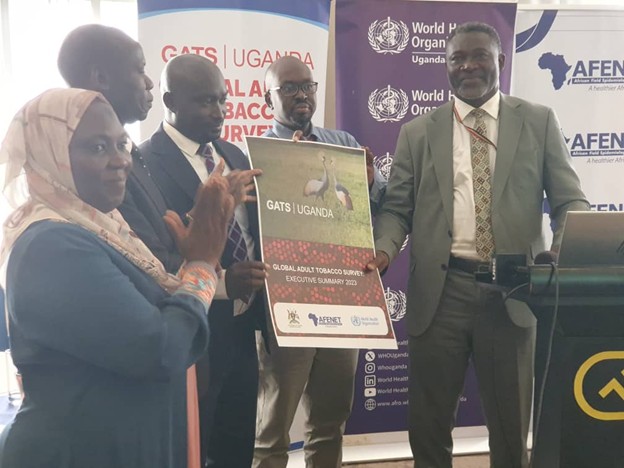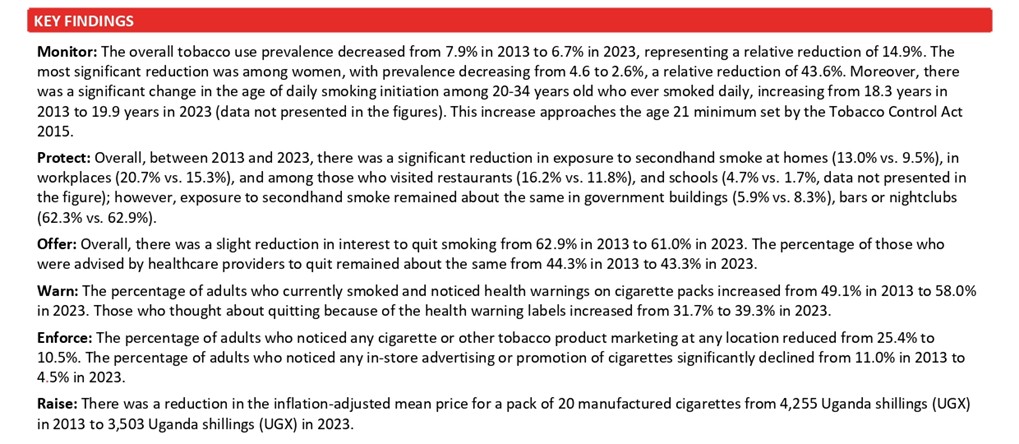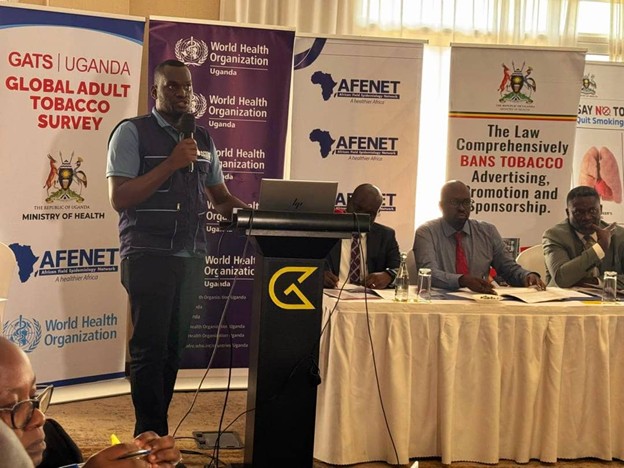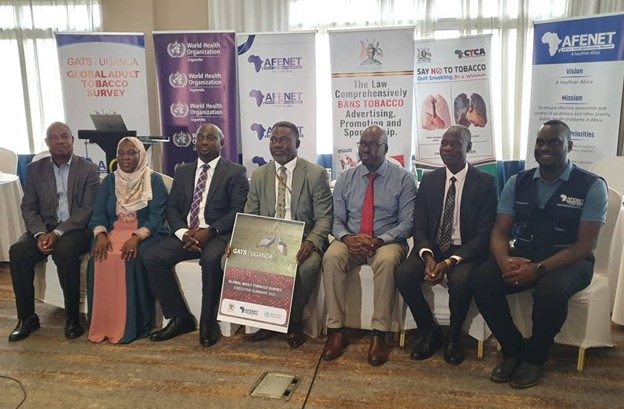Uganda disseminates 2nd Global Adult Tobacco Survey results
-
by
AFENET

Uganda has released findings from the second round of the Global Adult Tobacco Survey (GATS) conducted in 2023 showing a slight decrease in the prevalence of tobacco use.
Overall, the prevalence of tobacco use decreased, but not significantly, from 7.9% in 2013 to 6.7% in 2023, representing a 14.9% relative percent decline. The prevalence of tobacco use among women significantly declined from 4.6% in 2013 to 2.6% in 2023 (43.6% relative decrease); there was no significant change among men.
While presenting the findings on the behalf of the survey team, Mr. Joseph Magoola an epidemiologist with the African Field Epidemiology Network (AFENET) noted that since the first round of GATS was conducted in 2013, Uganda has had major changes in the tobacco control environment.
The most notable of these, he explained, was the enactment of the comprehensive Tobacco Control Act 2015, which is compliant with the World Health Organization’s (WHO) Framework Convention on Tobacco Control (FCTC). Against the MPOWER package of six evidence-based demand reduction measures outlined in the WHO FCTC, Uganda registered the following achievements between 2013 and 2023:

The health ministry conducted the survey with support from the CDC Foundation, AFENET, WHO, RTI International, and the Uganda Bureau of Statistics.

Silent epidemic
Represented by Senior Epidemiologist Dr Herbert Kazoora at the July 16 dissemination in Kampala, AFENET’s Head of Programs Dr Ditu Kazambu noted that Tobacco use is fueling a silent epidemic of non-communicable diseases across Africa and as a result, NCDs such as heart disease, stroke and several cancers are on the increase. “This increased burden strains families, healthcare systems & our economies amidst the scarcity of resources that we face. Uganda like many other Low to Middle Income Countries is faced with a duo burden Communicable and Non-communicable diseases arising from several risk factors including Tobacco use. The data generated from the Global Adult Tobacco Survey, 2023 gives us a solid foundation to better understand the current landscape of tobacco use in Uganda. Most importantly, with this second round, Uganda is now able to assess progress since the first GATS conducted in 2013, to evaluate the effectiveness of the tobacco control policies introduced since then and inform the next steps to be taken given the evidence generated now.”
Dr Aggrey Ngobi from the Prime Minister’s Delivery Unit in the Office of the Prime Minister observed that fighting an addictive vice arising out of an income generating crop is a big challenge and called for effective interventions including the enforcement of existing laws. “We should scrutinize these results and design interventions targeting each of the recommendations as laid down in the report.”
Dr. Hafsa Lukwata Sentongo, the Assistant Commissioner for Health Services in charge of Mental Health and Control of Substance Use and the Tobacco Control Focal Person at Uganda’s Health ministry decried the failure in enforcement of the tobacco control laws that has led to the continued importation of banned tobacco products which endangers the lives of users and non-users.
She said: “We banned shisha, e-cigarettes and related products but they are all here thanks to the weak enforcement of laws and aggressive advertising by the Tobacco Industry via nontraditional media.”
For GATS Uganda 2023, a total of 10,582 households were sampled, and one individual was randomly chosen from each selected household to participate in the survey. A total of 10,177 interviews were completed, yielding an overall response rate of 97.6%.





